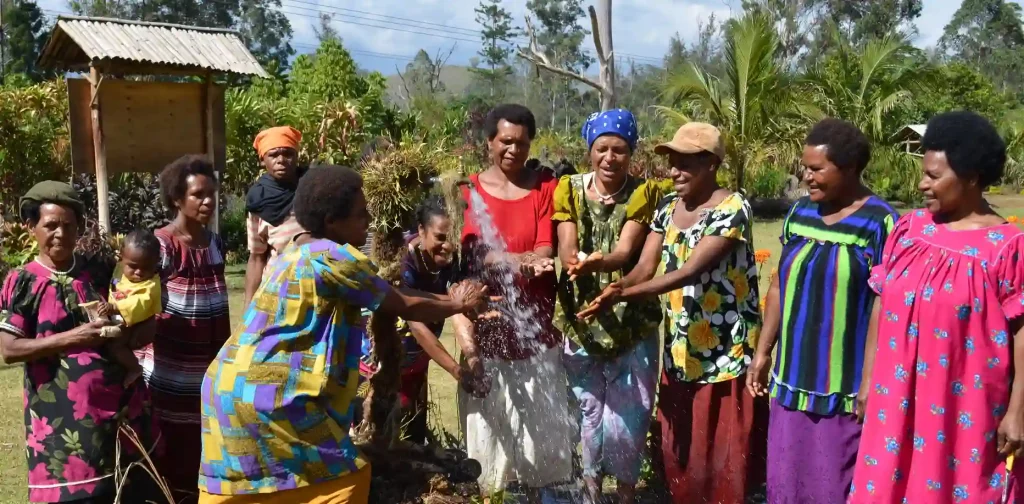Empowering Women in Papua New Guinea for Clean Water Access

Photo: eGuide Travel on Flickr
Access to clean water and sanitation is a fundamental human right for community wellbeing. However, women and girls often suffer the most from inadequate access, leading to health risks and susceptibility to infections. In Papua New Guinea, WaterAid aims to empower local women by building their skills to establish community-managed water sources.
Insufficient Access to Clean Water in Papua New Guinea
Papua New Guinea ranked among countries with the highest precipitation of rain. However, some regions face water scarcity during long dry spells. Paired with inadequate infrastructure of water treatment and distribution facilities, many Papua New Guineans still lack access to clean water, making the country among those with one of the lowest rates of water and sanitation access in the Pacific.
According to a report from the United Nations Joint Monitoring Program in 2023, only 44% of people in Papua New Guinea have access to clean water. This means only 1 out of every 3 Papua New Guineans can get safe water. As a result, many rural residents have to rely on sources like wells and streams, which may be contaminated. This exposure to unsafe water puts a large portion of the population at risk of waterborne diseases such as diarrhea and acute respiratory infections.
Water and the Gender Repercussions
From maintaining personal hygiene to childbirth, water is fundamental to the wellbeing of women. So, within a community, women and girls bear the disproportionate effects of water scarcity and unsafe water conditions, such as exposing them to risk of violence, health problems, and limiting work and education.
In Bialla, a local health center struggles with a lack of clean water and proper sanitation. Consequently, pregnant mothers are often asked to bring their own water for childbirth due to water shortages.
For young girls at school, lack of access to clean water could impact their adolescent years in terms of health and hygiene. With only half of the country’s schools having access to water and just over a quarter having adequate sanitation infrastructure, hygiene facilities like private toilets, hygiene products, and sanitary pads are not guaranteed.
Furthermore, women and girls are most likely to be assigned the task of collecting water from nearby sources. However, this journey usually involves long walks through difficult terrain that can take up to five hours one way. They must carry heavy water cans weighing up to 30 kilograms; with regularity, this may lead to long-term health implications.
Women, Community, and Clean Water
To address this disparity, the Australian Water Partnership through the WaterAid program aims to provide expertise and logistical support to tackle water access issues in the Wewak District, Papua New Guinea, by empowering local women with the necessary knowledge and skills to manage community-based water resources effectively.
The WaterAid program has developed a community engagement manual to enhance water access through community-based management. They conducted training for local women leaders to lead initiatives in rural areas, focusing on improving water security, gender equality, and climate resilience. The program activities range from training on water point mapping and sanitation promotion to climate impact mapping and gender transect walks.
The program highlights the importance of knowledge dissemination within communities to support their efforts in accessing clean water. After all, sustained efforts from multi-stakeholders are necessary to cultivate practices and implement new initiatives focused on empowering vulnerable groups. These practices may also ultimately lead to inclusive national-scale discussion and better policymaking to accelerate improvements in water and sanitation services amidst climate change.
Editor: Nazalea Kusuma

Co-create positive impact for people and the planet.
Amidst today’s increasingly complex global challenges, equipping yourself, team, and communities with interdisciplinary and cross-sectoral insights on sustainability-related issues and sustainable development is no longer optional — it is a strategic necessity to stay ahead and stay relevant.


 Strengthening Resilience amid Growing Dependence on Space Infrastructure
Strengthening Resilience amid Growing Dependence on Space Infrastructure  Indian Gig Workers Push Back Against 10-Minute Delivery Service Strain
Indian Gig Workers Push Back Against 10-Minute Delivery Service Strain  Call for Governance: Grassroots Initiatives Look to Scale Efforts to Conserve Depleting Groundwater
Call for Governance: Grassroots Initiatives Look to Scale Efforts to Conserve Depleting Groundwater  Integrating Environment, Climate Change, and Sustainability Issues into Education Systems
Integrating Environment, Climate Change, and Sustainability Issues into Education Systems  Finally Enforced: Understanding the UN High Seas Treaty
Finally Enforced: Understanding the UN High Seas Treaty  Risks and Opportunities of Submarine Communication Cables for Sustainable Development
Risks and Opportunities of Submarine Communication Cables for Sustainable Development